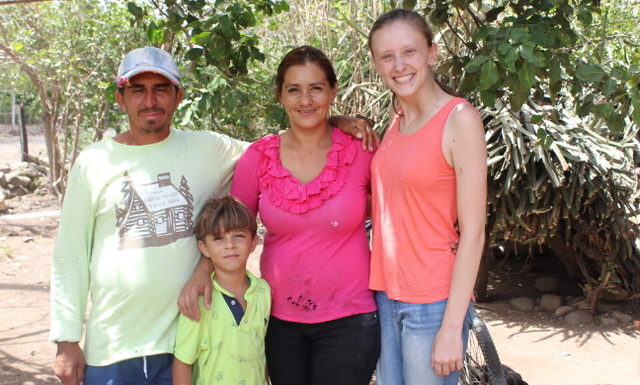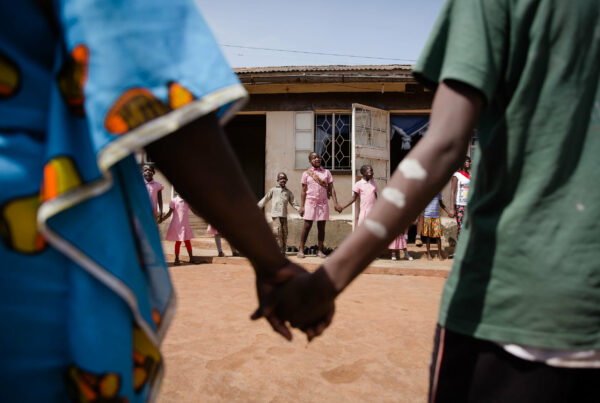In 2019, Nicole Opgenorth served as a Cultivate volunteer with CEPAD (the Council of Protestant Churches of Nicaragua). CEPAD works with 42 rural communities through five-year-long community development programs that include women’s economic development, organic agricultural training, pastoral leadership, and community leadership. Many international donors and churches come to visit and build relationships in the communities they support. Part of Nicole’s job as a Cultivate volunteer was to travel with some groups to translate and take photos/videos.
O n my first trip to el campo, the Nicaraguan countryside, I was accompanying a group from California to a community in a very dry region of the country. As we rode our bus into the flat landscapes and past small groups of houses, I was starting to get nervous. CEPAD was in the fifth year of working with this community, so we should have been able to see a lot of progress, but the landscapes we were passing were brown and gray, not a flourishing plant in sight.
So many questions were running through my head: What will be waiting for us? What happens if our visitors are disappointed? What kind of crops could we possibly grow in this dry, desolate land?
As we passed by the first few houses of this community, I couldn’t believe we were in the same place as these dry landscapes. Suddenly everywhere the eye looked was green. Flourishing fields of watermelon, orchards of fresh citrus fruit, flower gardens, everything I never would have imagined there.
Over the next few days, we visited farms and saw CEPAD’s farming program in action. It was so inspiring to watch these farmers beam with pride as they showed each plant, explained what kind of fruit it grew, how old it was, and any interesting facts about growing it. A few days wasn’t long enough, so I decided to go back by myself two weeks later for four days.
During this time, I had the opportunity to interview some of the farmers and families. I was invited into homes, fields, gardens, sacred spaces to listen to stories. It was an honor. One of the families I visited was Rito, Angelica, and their son, Kevin. They had me over for lunch where they fed me an overflowing plate of rice, beans, fried chicken, fresh fish, and fruit.
As we sat after lunch in the living room, two dogs coming in and out, the sun blazing down on us, I asked Rito about his crops and what life was like before he started CEPAD’s farming program. He had been forced to look for migrant work in order to provide for his family, often leaving for weeks at a time. CEPAD’s program allowed him to grow his own food for Angelica and Kevin to eat, but also to sell in order to buy school supplies.
When I asked him why he started working with CEPAD, I was surprised at his answer (translated here from Spanish):
“To be honest, I didn’t want to work with CEPAD at first. I didn’t think I could do anything with my land. But Salvador [a member of CEPAD’s regional staff] convinced me to give him six months. If nothing changed, he promised I could stop. But if I saw progress, I would keep going. That was the deal we made, and after six months, I did see progress, so I stayed in the program—and look at my land now! When some other people in the community saw what I was trying to do with my land, they called me crazy—there was no way we could grow crops in this dry region. Now that they see what I’ve grown, they have come to me asking me to teach them what I’ve learned.”
I loved that: They called me crazy, [but now] they have come to me asking me to teach them what I’ve learned. What a change of heart in his neighbors and what determination in Rito.
He went on to say:
“I never dreamed my land could look like this. I don’t have to travel to find work anymore and my son gets to eat fresh fruit and vegetables. He’s doing much better in school and I hope he’s able to go to university one day.”
Seeing first-hand how CEPAD is working in rural communities and how God is changing hearts made me so much more passionate about this ministry and sharing how it is changing lives in Nicaragua.
I am beyond excited that God has opened up the opportunity for me to return to volunteer with CEPAD from February to June of 2020. After that, I am hoping to move to Nicaragua full-time to continue documenting CEPAD’s work and connecting foreigners to their ministry. It’s a big dream, and some may call me crazy, but like Rito I am trusting God for his provision.
Nicole Opgenorth
Nicole Opgenorth serves with RCA Global Mission and CEPAD (the Council of Protestant Churches of Nicaragua). She amplifies voices, fosters relationships, and shares stories of impact with supporters. Nicole also serves as a cultural and language translator for visiting groups. Learn more about her work.



